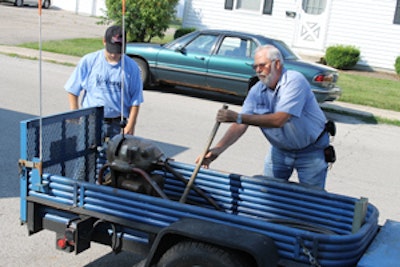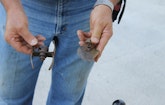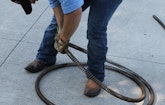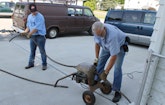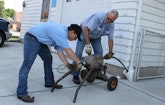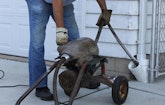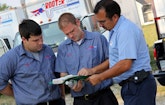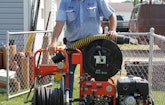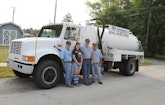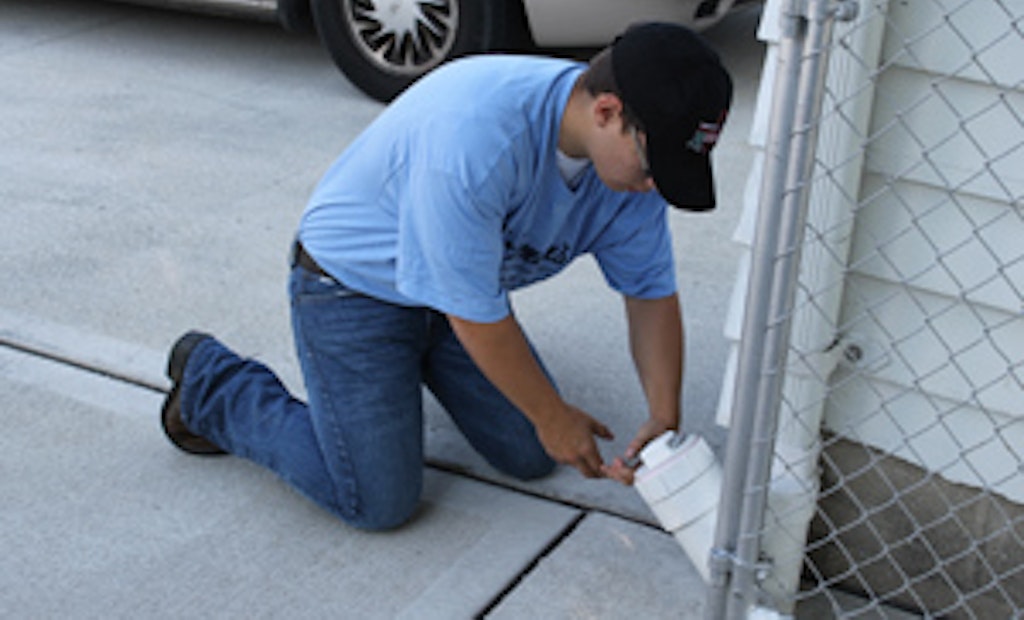Interested in Plumbing?
Get Plumbing articles, news and videos right in your inbox! Sign up now.
Plumbing + Get AlertsIt’s no small feat for a business to survive – and thrive – for almost 40 years. For Keith Kirkman, owner of Kirkman’s Plumbing & Eel Service in Greenville, Ohio, the formula centers on a basic, no-frills approach: Do a job right the first time, charge prices that cover expenses and generate a reasonable profit, invest wisely in good equipment, and do your own repairs to reduce expenses and minimize downtime.
“I’ve got about 15 plumbers in my area, and six or seven of them also do drain cleaning,” says Kirkman, 62 years young, who owns the company with his wife, Mary Lou. “I keep seeing more and more competition from out-of-towners who are branching out to find new customers. So I differentiate my business by doing things right the first time, so customers don’t have to call me back.
“I’m picky and I don’t cut corners – that’s the way my daddy taught me. And I’m staying fairly busy, so I figure I must be doing something right.”
Starting small
Kirkman has been doing it right ever since 1973, when he bought a residential plumbing business whose owner was retiring. Before that, he worked in a factory and “hated it with a passion.”
Plumbing was a totally different story. “I’ve been doing plumbing on and off on farms ever since I was eight years old,” Kirkman recalls. “I really liked the challenge. No two jobs are ever the same.”
Kirkman started with a small core of residential accounts and used the former owner’s business name for a couple of years to capitalize on the name recognition. Then he dropped the name in favor of Kirkman’s Plumbing and Eel Service and built the business from there.
Initially, he promoted the company through Yellow Pages advertising, lettering on his trucks, and word of mouth. But in line with his straightforward, keep-it-simple approach, he also relied on a small but effective marketing tool: blue-and-white paper stickers bearing the company name, logo and phone number.
“I use paper because the competition can’t tear them off as easily,” he says. “I put them on water heaters, furnaces and water softeners – basically anywhere they’ll stick. I always ask permission first, and I never cover up another business’s sticker, because the customer has the right to call whoever they want.
“I think it generates about one-third of my business. We get calls all the time from people who just bought a home and don’t know who to call when they have a problem – until they see the sticker.”
Stickler for detail
Of course, the stickers are useless if they aren’t backed up with good service. As Kirkman puts it, callbacks are a killer because there’s no profit in going back to do a job again – for free.
“I very seldom do less than two passes through a line,” he says. “In older homes where there’s no cleanout in the basement, I go twice from the access point in the parkway to the street, and twice from the access point to the basement. That’s above and beyond what most guys do. While I work, I’m also running water somewhere in the house so that whatever debris I cut loose gets flushed out.”
On 4-inch pipes, Kirkman first uses a 2-inch spade cutter to wrap up roots and pull them back toward him. Then he deploys a curved 3-inch H-cutter that gets up against the edge of the pipe. On 6-inch lines, he first uses a 4 1/2-inch spade cutter followed by a 4 1/2-inch H-cutter (all cutters from RIDGID).
While he works on a clogged drain, he asks the homeowner to fill the washing machine with water, then pause it when it’s full. When he’s finished, he asks the owner to activate the spin cycle. That sends a large surge of water through the drain, which he watches through the cleanout with a flashlight to ensure that the drain is fully cleared.
“Doing things right the first time provides value for the customer, and I don’t get many callbacks,” he says. “Now, everyone makes a silly mistake every so often. But it’s what you do about those mistakes that mean something to the customer.
“The bottom line is that callbacks are a profit killer. You lose the two hours you spent going back, plus the four or so hours you put in initially. You cannot make that up. In my opinion, if you’re going to work and not get paid, you might as well set your butt in a chair and watch NASCAR on TV.”
The right price
Proper pricing is another cornerstone of Kirkman’s success. He endorses the business advice of plumbing-industry legend Frank Blau, a strong advocate of flat-rate pricing. Kirkman first heard Blau speak at a Pumper & Cleaner Environmental Expo International more than 20 years ago.
“Until then, I was just trying to figure out how to make money, but I didn’t know what I was doing,” he says. “I was just sort of winging it. Making money? Yes, but only because of my business volume. But I wasn’t making enough.”
Kirkman attended Blau’s seminars for two or three years in a row and kept honing what he learned to fit his business. One of the most important things he learned was that everything is overhead. “That blows some people’s minds, but it’s true,” he says. “You have to factor in everything, from insurance, gas, and wages for your secretary, to your own wages and rent for your building and garage.”
Kirkman charges based on time and materials and customized Blau’s formulas to develop hourly labor rates.
All expenses
He also scrupulously accounts for every expense. For example, his service-call charge slides up a step for every five miles he travels out of town (he charges only for labor on the way back).
“You’ve got to cover things like fuel, truck wear and tear, and so on. It’s all part of your overhead, but most people don’t think of it that way. It’s nothing for me to go through two sets of brakes a year, so I have to bring in income to cover those expenses.
“I learned that from Blau. It was a revelation. It gave me confidence that I could make money. It did nothing but improve my business. We’re all technicians who have to become businessmen. For me, it added about 2 percent more profit per year. That may not sound like a lot, but if you figure it on your yearly gross income, it might be $10,000 or $20,000 a year.”
Kirkman adheres firmly to his pricing structure and refuses to meet competitors’ low-ball prices. What does he tell price-shopping customers? In short, cheaper is not necessarily a value. “If you buy a Yugo and a Cadillac, you know they’re not similar cars,” he says. “Just like if you buy a cheap eel machine that breaks down all the time, you’re not saving money.
“When people resist, I tell them they get exactly what they pay for. I’ve been doing this for more than 30 years and I know my equipment and what it can do. You as a homeowner can make the decision from there. If someone else’s price is all you consider as a businessman, you’ll be out of business. If you’re not making money, you should close down and work for someone else. And I don’t want to work for someone else.”
Equipment counts
Good service requires good equipment. Kirkman relies on a Dodge service van and a long-wheelbase Dodge service van, along with three RIDGID K-1500 sectional drain-cleaning machines; two RIDGID K-50 sectional machines for smaller pipes; and a J-3000 portable jetter (4,000 psi/4 gpm) from General Pipe Cleaners.
He recently added a 2006 Isuzu NPR truck with a 16-foot box body by Supreme Corp., outfitted with shelving from Hackney USA. Eventually, Kirkman plans to consolidate everything in the two older vans into the larger truck. Because the newer vehicle has more cargo space, he’ll be able carry items he usually stores in his garage, reducing loading and unloading.
Kirkman also does some septic tank pumping, which makes up about 10 percent of his business. Drain cleaning and plumbing generate about 65 percent, and electrical and HVAC work make up the rest. For septic pumping, he uses a 1991 International 4900 with a 2,100-gallon steel tank he installed himself. It includes a Jurop pump.
The septic tank business was a natural complement to the drain-cleaning side: Septic system work often generates drain-cleaning jobs that require use of his portable jetter to clean clogged lines.
DIY repairs
To reduce downtime and expenses, Kirkman does most equipment repairs himself. To that end, he believes in buying one brand of equipment as much as possible to increase efficiency and to have access to backup parts and equipment.
“I don’t have time to order parts and then wait a week to get something fixed,” he says. “That’s why I have one name brand of drain machine. I can take a part off of a backup, or just use the backup.
“I keep enough parts on hand to rebuild my drain machines. I started doing that shortly after I went into business because I learned pretty quickly that you’ve got to have spare parts for things that normally wear, or you’re out of business.”
He’s also big on routine maintenance. For example, Kirkman gives the two grease fittings on the RIDGID machines one shot of grease every 30 days. “My daddy taught me that grease is cheaper than parts,” he says. “Keeping machines clean improves profitability because I believe clean machines work better. And if it looks clean, the ladies are happier, too.”
Continuing education
As much as Kirkman has learned over the years, he’s still eager to learn more. Along with taking classes required to renew his state plumbing and electrical licenses, he attends an annual regional plumbing and heating expo in Columbus, and another in Indianapolis. He also touts the Pumper & Cleaner Expo, which he hasn’t missed more than a handful of times.
According to Kirkman, there’s also a less tangible reward to continued education: It makes work more enjoyable. “I learn something new every week,” he says. “That’s what makes it fun, I think.” And helps him keep doing jobs right the first time.
